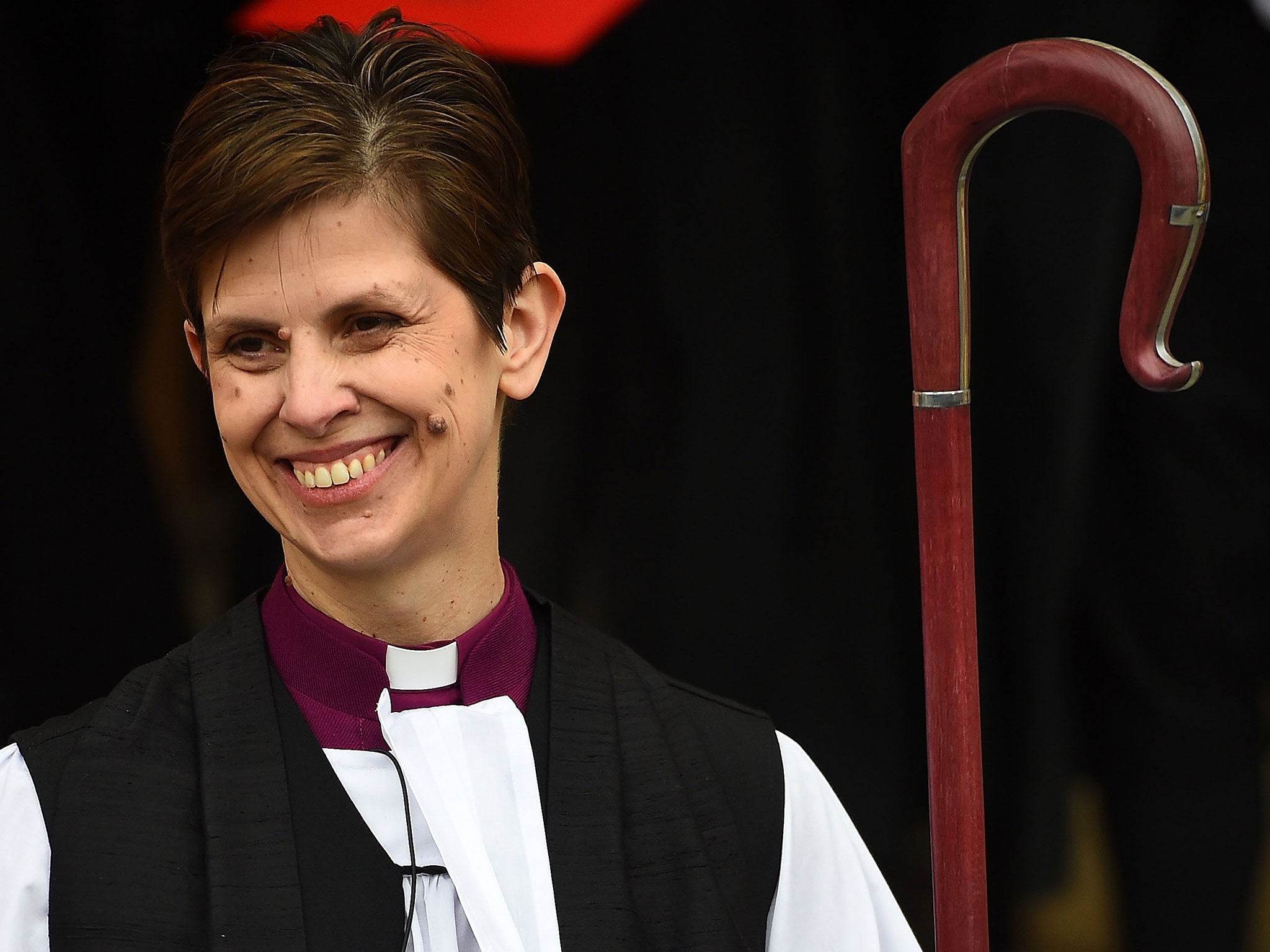Libby Lane: We are the Church's 'new normal', says Britain's first female bishop
As she approaches the first anniversary of her consecration, the Right Reverend Lane talks of her desire to inspire a generation of women to 'do something extraordinary'

The first female bishop to be consecrated by the Church of England has opened up about her "remarkable" year and spoken of her delight that the ordination of women is becoming the "new normal".
In 2014 the Church formally adopted legislation permitting women to become bishops and, on 26 January last year, Libby Lane smashed the stained-glass ceiling when she was consecrated as the eighth Bishop of Stockport.
As she approaches the first anniversary of her consecration, the Right Reverend Lane told The Independent of her desire to inspire a generation of women to “do something extraordinary”, saying: “When I was growing up it wasn’t possible for women to be ordained as priests, never mind bishops. It wasn’t part of my expectations.”
The Rev Lane went on: “One of the most moving things about this extraordinary year is how ordinary it has been.”
Her duties last year ranged from handing out awards for the best cows at a county show to visiting the Democratic Republic of Congo, where she addressed a crowd of 6,000 people.
“There was the remarkable moment of the consecration of the first female bishop but actually the living of it hasn’t been extraordinary,” she said. “It has been very positive and smooth, a very good year – not strange or unusual.”
While certainly a minority group, she now believes female bishops are no longer “unusual”. She said: “I was the first but seven other women have been appointed in these past few months. The Church has moved so quickly into a new normal where the appointment of women bishops is as expected as the appointment of men.”
That is not to say the Rev Lane has not been confronted by any resistance or, as she put it, “disquiet”. Her consecration ceremony at York Minster was disrupted by notorious ultra-conservative priest, the Rev Paul Williamson, exclaiming: “Not in the Bible.”
Describing him as a “serial protester” whose attendance had been anticipated, a Church of England spokesman later said: “He’s got the right to protest but the contrast was between a lone voice protesting and a sea of voices affirming.” Reflecting on the “very public” moment during her consecration, the bishop tactfully concluded the unwelcome interruption was “dealt with very graciously”.
The Rev Lane is the consummate diplomat when it comes to discussing contentious issues, not least the accusations of deep-rooted homophobia that have been levelled against the Church by members of the clergy and public alike.
This month more than 100 senior Anglicans signed an open letter to the Archbishops of Canterbury and York urging the Church to “repent” for discriminating against gay, lesbian and bisexual Christians. Just last week, however, Church leaders voted to condemn same-sex marriage, stating that marriage should be between “a man and a woman in faithful, longlife union”.
“I want to echo [the Archbishop of Canterbury, Justin Welby’s] words, which recognised and expressed personal regret for the deep pain and hurt that… the current position of the Church has caused,” Bishop Lane said.
But although she acknowledged “the sense of sadness that positions of conscience cause individuals and communities”, she refused to reveal whether she was personally in favour of same-sex marriage.
“I belong to an organisation that works to hold together people of a very broad spectrum,” said the bishop. “That can be a hard thing to be part of [but] I work within my institution and am loyal.”
Nevertheless, she promised the issue would continue to be the subject of “ongoing conversations” and pointed out: “It took decades for the Church to come to [accept] the ordination of women.”
Despite admitting to feeling “a little embarrassed” at the attention she has received since her consecration, the Rev Lane hopes that her appointment will raise the aspirations of others, particularly young women, and inspire them to realise their potential.
She believes the attention lavished on her was not solely about her as an individual but what her consecration represents to people “of all faiths and none” across society.
“It clearly resonated with people,” she said. “If a young woman thinks her choices are limited, lifts her eyes and thinks, ‘Perhaps I can do something extraordinary,’ that’s a good day.”
Join our commenting forum
Join thought-provoking conversations, follow other Independent readers and see their replies
Comments